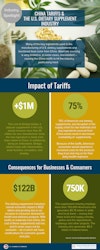With the recent announcement that the U.S. is implementing a 10% tariff on an additional $300 billion worth of goods imports from China, U.S. industries are bracing for the brunt of these costs.
This new tariff is the latest in the rounds of tariffs the U.S. has placed on Chinese imports in the past year. Starting in July 2018, the U.S. has imposed tariffs of 25% on $250 billion of these goods, and the White House has been preparing to roughly double the reach of these tariffs to cover virtually all goods from China. China has retaliated with tariffs on $110 billion of U.S. exports and, with the U.S.’s most recent announcement, China will raise its average tariff on U.S. goods from 3.1% in 2017 to 20% as of September 1, according to a report by the Peterson Institute for International Economics.
The trade war with China is a major driver of lost exports – and the results have been brutal for American businesses. Earlier this year, the Institute of International Finance reported that the U.S.-China trade war is “costing the U.S. the equivalent of about $40 billion a year in lost exports,” according to a Bloomberg summary. China’s retaliatory duties led “to a collapse in many of the roughly 900 categories of targeted American products.”
The U.S. Chamber of Commerce is sitting down with various industries to understand just how the tariffs and the U.S.’s overall trade war with China is affecting American companies and workers. One area particularly affected is the dietary supplement industry. We discussed the consequences on the tariffs with the Council for Responsible Nutrition, the leading trade association representing dietary supplement and functional food manufacturers and ingredient suppliers. Here is what we found out:

About the author

Kaitlyn Ridel
Kaitlyn Ridel is the former Senior Director of Digital Content at the U.S. Chamber of Commerce.




